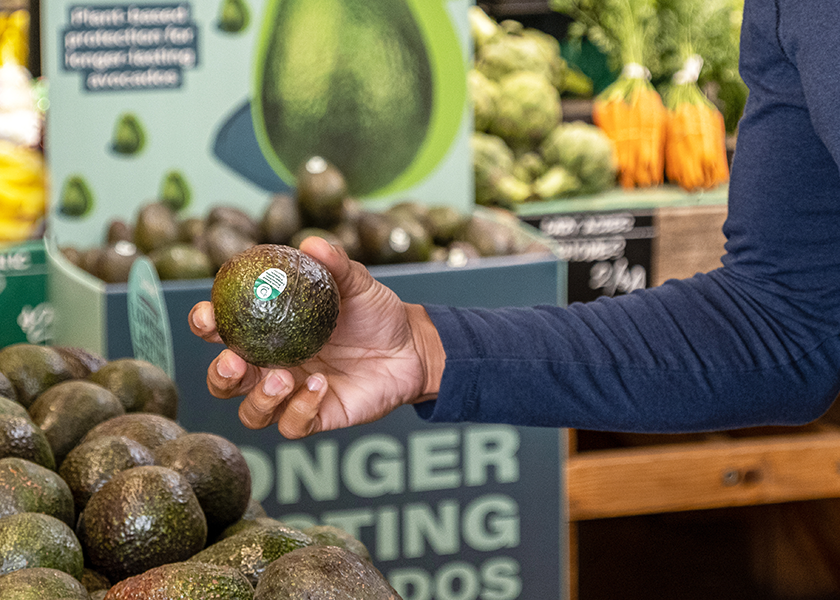How technology is tackling food waste and changing the fresh produce supply chain for the better

America has a weight problem — and it’s not an obvious one.
Each year, a staggering 119 billion pounds of food — nearly 40% of all food — is wasted in the U.S., which equates to $408 billion in food thrown away, according to Feeding America.
Making these food waste figures more sobering still is the USDA’s estimation that over 34 million people are food insecure in the U.S.
But increasingly, companies across the fresh produce supply chain are driving and embracing technology to stem the tidal wave of food waste.
Companies like Hazel Technologies in Chicago, Ill.
“Looking ahead at 2023, Hazel plans to prevent more than 250 million pounds of fresh produce from going to waste,” said Kellen Stailey Martin, vice president of marketing. “We do this by developing simple, chemistry-based technologies for growers, exporters and retailers that reduce waste by significantly extending fruit and vegetable shelf life.”
Stailey Martin says Hazel’s partners find that integrating Hazel products within their supply chains allows them to maintain and exceed high-quality standards, protect against cold chain breaks and other transit-related challenges that keep good food from reaching retail, restaurants or consumer fridges.
Preventing food waste also prevents profit loss.
“This year, we’re driven to reinforce our partnerships with a global network of growers and retailers who understand that their waste and shrink is a problem that can be managed with upside.
“As long as concerns around costs, product complexity and ROI of agriculture technology are addressed by technology creators, growers and retailers alike will continue seeking out innovations that optimize their returns, minimize their financial risk and help transition them to a more sustainable food system,” she continued. “This is where technology can really step in and make a difference.”
Related news: Careit app to help grocers with surplus food rescue
Better berries and cherries
In October, Hazel introduced Hazel BreatheWay, a modified atmosphere packaging, fused with a smart membrane technology that keeps raspberries fresh during transit and protected during cold chain breaks, Stailey Martin said.
“We know that berries are particularly sensitive to changes in atmospheric gas ratios, especially spikes in [carbon dioxide],” she said. Maintaining optimal gas level ranges within berry packaging results also results in more quality, marketable fruit.
Hazel has since extended the product line to include solutions for blackberries, blueberries and strawberries. It also recently completed Southern Hemisphere trials on cherries.
“We’re feeling optimistic that 2023 will bring a new product offering for this key export category,” Stailey Martin said of cherries.

The science of ripeness
Goleta, Calif.-based Apeel Sciences has its sights set on a perfectly ripe avocado at retail.
In partnership with suppliers and retailers, Apeel is working to ensure “the ideal level of avocado ripeness can be on shelves for the consumers,” says Ryan Fink, senior vice president, Americas. “We’re aiming to enable the growth that comes from successful ripe avocado programs, without a lot of loss along the way.”
Apeel says its plant-based protection, coupled with unique quality-control tools, make it possible for retailers to deliver on ripeness every time a customer shops for an avocado.
Fink says the Apeel product’s ability to extend the time at peak ripeness by nearly three days was recently validated in a study with the University of Illinois.
More sustainability news: Food and tech leaders discuss setting goals that go beyond 'greenwishing'
“Going into 2023 we are really focused on making sure the technology we’ve spent years developing is being applied everywhere to ensure the entire supply chain reaps the benefits of high-quality and longer-lasting produce,” Fink said.
Apeel has developed a platform of technologies, including quality tools and data models, that measure the level of ripeness and shelf life more efficiently, helping everyone from packers to consumers get avocados at the right stage, he said.
“People like to joke that choosing a ripe piece of produce, especially an avocado, isn’t an exact science, but it is, and we’ve made it our business to be the experts,” Fink said. “The more we include technology throughout the food supply chain to make and measure the time we have with produce, the better armed we will be when it comes to tackling food waste and its impact on climate change.”
The role of RPCs
Whether protecting against product damage during transport or extending product life with containers that promote cooling and ventilation, reusable, returnable plastic containers are another tool with which to tackle food waste across the supply chain.
“We look at the entire ecosystem of the produce industry to find new ways to improve and work across the journey from agriculture to retailers and waste haulers,” said Jonathan North, vice president of sustainability and core solutions for Rehrig Pacific, Los Angeles.
One of Rehrig’s newest products for 2023 is the 1-Yard Food Waste Container that is designed to be used at grocery stores, restaurants and other commercial locations that collect food waste.
“As states like California continue to add legislation for how ‘organic yard and food waste’ are disposed of, we are committed to finding ways to make it easier,” said Rebecca Vara, director of sales, environmental.
Rehrig sees technology continuing to play a vital role in reducing food waste.
“Technology embedded in reusable plastic packaging products offers opportunity to gather data and analytics throughout the supply chain,” North said. “This data can include location, dwell time, temperature, shock and impact.
“These data points can then be used to correlate to product damage and in turn be used to help identify, reduce and eliminate the cause of this damage and the resulting food waste,” North continued. “This type of technology continues to develop; packaging is shrinking, capabilities are improving and the economics are becoming more favorable — all of which will support more widespread implementation and adoption.”







